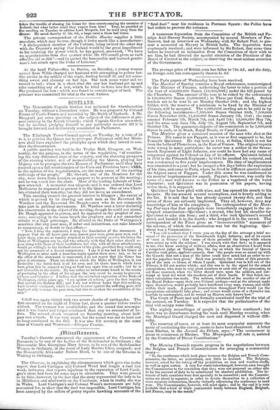SCOTLAND.
The Honourable Captain Gordon was reelected for Aberdeenshire on Tuesday, without a dissentient voice. He was proposed by Colonel Fraser of Castle Fraser, and seconded by Mr. Smith of Saphock. A Mr. Sheppard put some questions on the subject of the differences at pre- sent existing in the Scotch Church ; which Captain Gordon answered; but he declined pledging himself to any particular measure till it is brought forward and deliberately considered in Parliament.
The Edinburgh Town-Council agreed, on Tuesday, by a vote of 18 to 5, to petition the Queen not to prorogue Parliament until her Minis- ters shall have explained the principles upon which they intend to con- duct the Government.
A public meeting was held in the Trades Hall, Glasgow, on Wed- nesday, for the purpose, in the terms of the requisition, "of consider- ing the very distressed state of the country, and the alarming prospects of the ensuing winter, and of memorializing the Queen, praying her Majesty not to prorogue the two Houses of Parliament until they have entered upon a full consideration of the Corn and Provision laws ; whffili, in the opinion of the requisitionists, are the main cause of the existing sufferings of the people." Mr. Oswald, one of the Members for the city, went down from London on purpose to be present at the meeting ; and he was voted into the chair. Most of the leading Liberals of Glas- gow attended. A memorial was adopted; and it was ordered that Lord Melbourne be requested to present it to the Queen. One or two Chart- ists obtruded their remarks, but they did not move an amendment. This meeting created the greatest interest in Glasgow ; the extent of which is proved by its drawing out such men as the Reverend Dr. Wardlaw and the Reverend Dr. Heugh—men who do not commonly take part in political movements. Dr. Wardlaw sent a letter declaring hM concurrence in the object of the meeting, though he could not attend. Dr. Heugh appeared in person, and he appeared as the prophet of suc- cess ; conveying in the same breath the prophecy and a not unmerited rebuke to a high personage. He alluded to the Duke of Wellington's assertion that any poor man, if sober and industrious, can raise himself to competency, or words to that effect-
" Now, I deny the statement, I deny the foundation of the statement. I suppose that we all know poor men, honest poor men, pions poor men, and I know them, who are as warmly attached to their country as even his Grace the
Duke of Wellington can be, and who ardently wish that their ashes should re- pose along with those of their forefathers, but who, with all these attachments, would go willingly to the furthest corner of the globe, provided they could only
get the assurance of a decent competency. I say it is too bad in his Grace of Wellington to utter such a heartless taunt against these men: but, so far as the effect of the statement is concerned, I do not regret that his Grace has given it utterance. There are fields in which the Duke of Wellington is not invincible : the battle-field is all his own, and let those laurels which have been given him be enjoyed as long as God may spare him on earth ; but he is not invincible in the senate. He has rather an unfortunate knack in the senate of producing by the effect of his adages the very event he means to prevent. (Cheers and laughter.) I believe that the celebrated expression of the Duke of Wellington, eleven years ago, I am against all reform,' gave the first impulse that carried the Reform Bill; and I am not without hopes that this reckless, bard-hearted sentiment, which he dared to utter against the suffering poor, will tend not only to rouse the poor man, but also to awaken the sensibilities of the rich."
Crieff was again visited with two severe shocks of earthquake. The first occurred on the night of Friday last, about a quarter before twelve o'clock. The tremour was considerable, and the sound that accompa- nied it was louder and longer-continued than any we remember of be- fore. The second shock occurred on Saturday morning, about half- past two o'clock. It was very smart, but the sound was not so loud nor so long-continued as the first. It was also felt severely at the same time at Comrie and Westward.—Glasgow Courier.


























 Previous page
Previous page